Related Research Articles
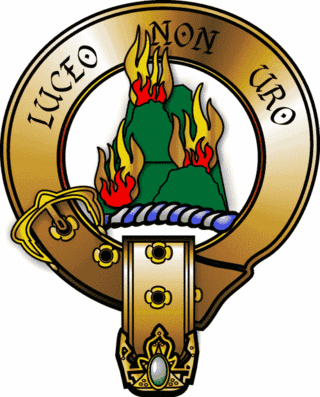
Clan Mackenzie is a Scottish clan, traditionally associated with Kintail and lands in Ross-shire in the Scottish Highlands. Traditional genealogies trace the ancestors of the Mackenzie chiefs to the 12th century. However, the earliest Mackenzie chief recorded by contemporary evidence is Alexander Mackenzie of Kintail who died some time after 1471. Traditionally, during the Wars of Scottish Independence, the Mackenzies supported Robert the Bruce, but feuded with the Earls of Ross in the latter part of the 14th century. During the 15th and 16th-centuries the Mackenzies feuded with the neighboring clans of Munro and MacDonald. In the 17th century the Mackenzie chief was made Earl of Seaforth in the peerage of Scotland. During the Scottish Civil War of the 17th century the Mackenzies largely supported the Royalists. During the Jacobite rising of 1715 the chief and clan of Mackenzie supported the Jacobite cause. However, during the Jacobite rising of 1745 the clan was divided with the chief, Kenneth Mackenzie, Lord Fortrose, supporting the British-Hanoverian Government and his relative, George Mackenzie, 3rd Earl of Cromartie, supporting the Jacobites.

Clan Grant is a Highland Scottish clan.

The Clan Macrae is a Highland Scottish clan. The clan has no chief; it is therefore considered an armigerous clan.

Clan MacDonell of Glengarry is a Scottish clan and is a branch of the larger Clan Donald. The clan takes its name from River Garry where the river Garry runs eastwards through Loch Garry to join the Great Glen about 16 miles (25 km) north of Fort William, Highland. The progenitor of the MacDonells of Glengarry is Reginald, 4th great-grandson of the warrior Somerled. The clan chief is traditionally designated as the "Son of Alexander's son".
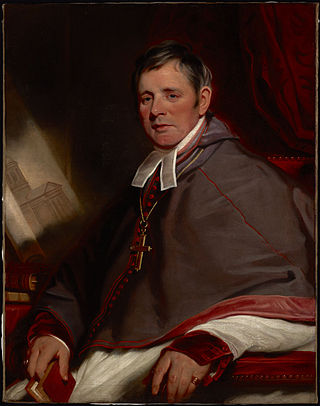
Bishop Alexander Macdonell was the first Roman Catholic bishop of Kingston, Upper Canada.

Clan Fraser of Lovat is a Highland Scottish clan and the principal branch of Clan Fraser. The Frasers of Lovat are strongly associated with Inverness and the surrounding area since the Clan's founder gained lands there in the 13th century.

Clan Chisholm is a Highland Scottish clan.
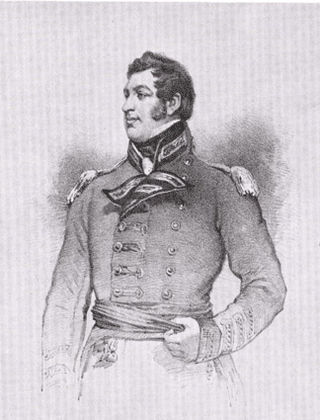
Francis William Ogilvy-Grant, 6th Earl of Seafield was a Scottish nobleman, a Member of Parliament and is listed as the 25th Chief of The Clan Grant. He served as Lord Lieutenant of Invernessshire.
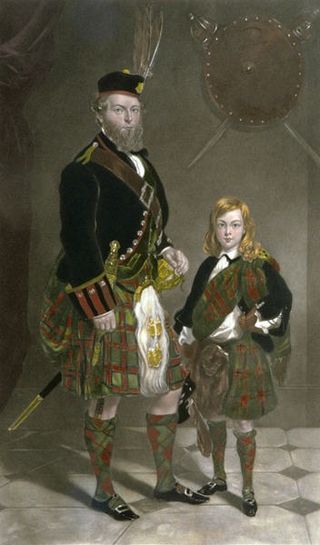
John Charles Ogilvy-Grant, 7th Earl of Seafield, KT, styled Viscount Reidhaven from 1840 to 1853, was a Scottish nobleman. He is numbered as the 26th Chief of Clan Grant.

The Battle of Mulroy was a Scottish clan battle fought in August 1688 in the Lochaber district of Scotland. It was fought between the Clan Mackintosh who were supported by government troops under Kenneth Mackenzie of Suddie against the Clan MacDonald of Keppoch who were supported by the Clan Cameron over disputed lands in the Braes of Lochaber. The battlefield has been inventoried and protected by Historic Scotland under the Scottish Historical Environment Policy of 2009.

Clan Macdonald of Clanranald, also known as Clan Ranald, is a Highland Scottish clan and a branch of Clan Donald, one of the largest Scottish clans. The founder of the Macdonalds of Clanranald is Reginald, 4th great-grandson of Somerled. The Macdonalds of Clanranald descend from Reginald's elder son Allan and the MacDonells of Glengarry descend from his younger son Donald. The clan chief of the MacDonalds of Clanranald is traditionally designated as The Captain of Clanranald and today both the chief and clan are recognised by the Lord Lyon King of Arms, the heraldic judge in Scotland.

Clan Macdonald of Sleat, sometimes known as Clan Donald North and in Gaelic Clann Ùisdein, is a Scottish clan and a branch of Clan Donald—one of the largest Scottish clans. The founder of the Macdonalds of Sleat was Ùisdean, or Hugh, a 6th great-grandson of Somerled, a 12th-century Lord of the Isles. The clan is known in Gaelic as Clann Ùisdein, and its chief's Gaelic designation is Mac Ùisdein, in reference to the clan's founder. Both the clan and its clan chief are recognised by the Lord Lyon King of Arms, who is the heraldic authority in Scotland.
The Clan MacDonald of Lochalsh was a Scottish family and a branch of the larger Clan Donald.
Sir Alexander Matheson, 1st Baronet, JP, DL was a British China merchant, Liberal Member of Parliament, and railway entrepreneur.

Erchless Castle is an L-plan castle in northern Scotland, near Struy, Highland. The current building was built in about 1600. The castle is located at the northeast end of Strathglass at the point where the Erchless Burn enters the River Beauly, itself newly formed from the confluence of the rivers Glass and Farrar immediately to the south of the castle.
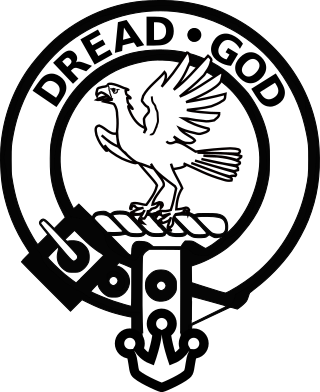
Clan Munro is a Highland Scottish clan. Historically the clan was based in Easter Ross in the Scottish Highlands. Traditional origins of the clan give its founder as Donald Munro who came from the north of Ireland and settled in Scotland in the eleventh century, though its true founder may have lived much later. It is also a strong tradition that the Munro chiefs supported Robert the Bruce during the Wars of Scottish Independence. The first proven clan chief on record however is Robert de Munro who died in 1369; his father is mentioned but not named in a number of charters. The clan chiefs originally held land principally at Findon on the Black Isle but exchanged it in 1350 for Estirfowlys. Robert's son Hugh who died in 1425 was the first of the family to be styled "of Foulis", despite which clan genealogies describe him as 9th baron.

The Mackays of Aberach also known as the Clan Aberach are a Scottish family and a branch of the ancient Clan Mackay of the Scottish Highlands. They were the senior cadet branch of the Clan Mackay and were seated at Achness, in Strathnaver, which is in modern-day Sutherland. In Scottish Gaelic they are known as the Sleaght-ean Aberigh.
Thomas McLauchlan (1815–1886) was a Scottish minister and theological author who served as Moderator of the General Assembly for the Free Church of Scotland 1876/77.

Gustavus Aird (1813–1898) was a Scottish minister of the Free Church of Scotland who served as Gaelic Moderator of the General Assembly in Inverness in 1888. He was an active campaigner against the Highland Clearances.

The Mackenzies of Gairloch were a minor noble Scottish family and one of the senior cadet branches of the Clan Mackenzie, a Scottish clan of the Scottish Highlands.
References
- 1 2 3 4 5 6 7 8 9 10 11 12 13 MacKenzie, Alexander (1891). History of the Chisholms, with genealogies of the principal families of the name. A & W MacKenzie. pp. 103–116.
- ↑ "Fendall, Henry [Benson] (FNDL811H)". A Cambridge Alumni Database. University of Cambridge.
- ↑ "Chisholm, Alexander William (CHSN828AW)". A Cambridge Alumni Database. University of Cambridge.
- 1 2 3 4 5 6 7 8 Anderson, James S. M. (1842). Memoir of the Chisholm. J. G. F & J Rivington.
- ↑ Chisholm, Colin (1878). "The Clearance of the Glens". Celtic Magazine. III: 378–388.
Attribution
- This article contains text, now in the public domain, from MacKenzie, Alexander (1891). History of the Chisholms, with genealogies of the principal families of the name. A & W MacKenzie. pp. 103–116.